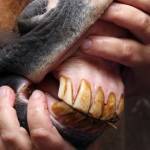Open Wide: Keeping Your Horse’s Mouth Healthy

Most horse owners recognize the signs associated with severe dental problems: feed dropping from the mouth, quidding, and loss of condition. Abnormalities may include loose, abscessed, fractured, or painful teeth, and these conditions might stem from a simple dental cavity.
“Unidentified and untreated dental cavities may negatively affect a horse’s quality of life, welfare, and overall health,” shared Kathleen Crandell, Ph.D., an equine nutritionist for Kentucky Equine Research.
Dental cavities, also referred to as caries, are lesions that destroy the calcified tissue of the tooth. According to a recent study*, dental caries seem to be more common than once thought. Researchers described two different types of dental caries: infundibular caries that involve the occlusal surface of the tooth (that surface that makes contact with the opposing tooth) and so-called peripheral caries (PCs) that involve any other surface of the tooth.
In that study, PCs were present in 51.7% of the 706 examined horses. Almost one-quarter of those horses (23.2%; 164 of 706) had PCs only, whereas 28.5% (201 of 706) had both infundibular and PCs. PCs were more commonly identified in cheek teeth, and only very rarely affected the incisors and first premolar (“wolf”) or canine teeth. When PCs were identified, they usually occurred on both sides of the mouth and usually on the mandibular cheek teeth (the bottom row of molars).
Is your horse at risk of developing PCs? Absolutely. As in humans, acid-producing bacteria living in dental plaque contribute to dental destruction. Other risk factors for the development of PCs include:
- The presence of infundibular caries makes it more likely that your horse will also have PCs;
- Horses with diastemata—abnormal spaces between adjacent incisors or cheek teeth; and
- Dental fractures, overgrowths, and other dental disorders.
Does feeding sweet feed contribute to the development of dental caries? A study by Borkent and coworkers found that only the group of horses fed between 4.5-6.5 lb (2.1-3 kg) concentrates per day had an increased risk of PC compared to horses fed no concentrates.
Although dental health is an integral component of a horse’s overall health, Crandell tempers the study findings by adding, “Note that this study was conducted in the UK. Comparable studies done in other parts of the world have found much lower incidences of PCs. Previously published studies also found only a very limited association between cavities and concentrate intake, and there appeared to be a much more significant influence of region than amount of feed given.”
An annual dental examination usually provides sufficient care for most horses. Those horses with a known problem might be seen more frequently.
*Borkent, D., R.J.M. Reardon, G. McLachlan, S. Smith, and P.M. Dixon. 2016. An epidemiological survey on the prevalence of equine peripheral dental caries in the United Kingdom and possible risk factors for its development. Equine Veterinary Journal:12610.








